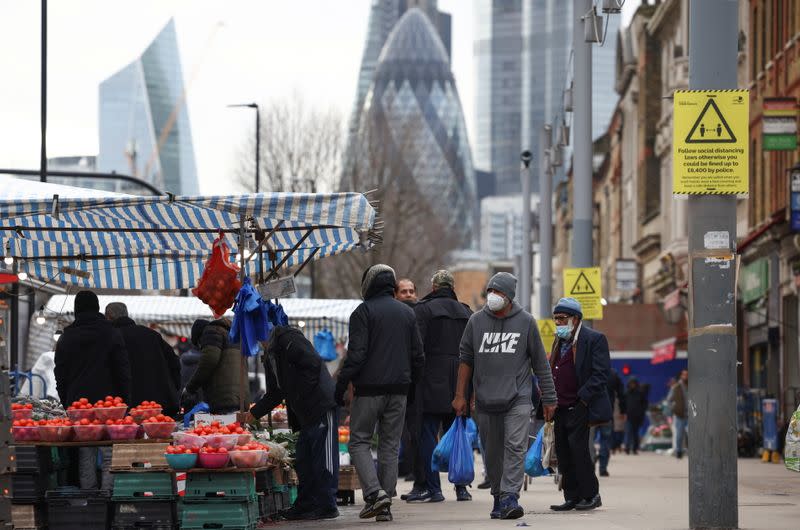By Guy Faulconbridge and Kate Holton
LONDON (Reuters) – British Prime Minister Boris Johnson said on Monday that he would plan a cautious, but irreversible, way out of the COVID-19 blockade this week after vaccinating 15 million vulnerable people.
With nearly a quarter of Britain’s population now inoculated with the first dose of the COVID vaccine in just over two months, Johnson is under pressure from some lawmakers and companies to reopen the economy.
“We have to be very cautious and what we want to see is cautious but irreversible progress,” Johnson told reporters. “If possible, we will set dates.”
Johnson, who is due to set his way out of the blockade on February 22, said infection rates are still high and that many people are still dying.
Speaking later on Downing Street, Johnson said there was still not enough data on how vaccines were affecting the spread of COVID-19, although the data from Israel, currently the world leader in vaccination, was promising.
“If you look at the data, for example, from Israel, you can really see the effect, in the UK we can calculate an effect, but it is much better when we can actually see it, when it is big enough to actually be able to see “said the government’s chief medical advisor, Chris Whitty.
Whitty also said that there were several variants that appeared to slightly reduce the effectiveness of vaccines available today.
Johnson said he would do everything he could to ensure that schools reopened on March 8.
If many people become infected, there will be a high risk of mutating the virus and an increased risk of spreading to older and vulnerable groups, he said.
The largest and fastest global vaccine rollout in history is seen as the best chance of getting out of the COVID-19 pandemic, which killed 2.4 million.
Britain has the fifth worst official death toll in the world – 117,396 – behind the United States, Brazil, Mexico and India.
VACCINE PASSPORTS?
Britain vaccinated 15.3 million people with a first dose and 539,630 with a second dose, the fastest per capita distribution of any major country. Hancock said he expects vaccine supplies to increase as manufacturing accelerates.
An influential group of lawmakers from the Johnson Conservative Party are calling for an end to the blockade as soon as the nine most vulnerable groups are vaccinated. They don’t want any more rules after May 1st.
“We are all filled with sadness for the people we have lost, for the damage we have suffered, but we do not honor those we love and lose by destroying the rest of our lives,” said lawmaker Steve Baker. “We have to find a way to rebuild our society and our economy and our prospects, our livelihood.”
Britain is talking to other countries about giving its citizens certificates that they have been vaccinated so that they can travel abroad in the future, to countries that require them.
“This will be very much in the mix, in the future I think it will happen,” said Johnson.
“What I don’t think we will have in this country is, so to speak, vaccination passports to allow you to go to the bar, or something.”
Johnson said Britain would guarantee mass vaccinations and rapid tests for nightclubs and theaters, rather than requiring certification for a normal life.
(Reporting by Guy Faulconbridge and Kate Holton; Editing by Peter Graff, Nick Macfie, Bernadette Baum and Giles Elgood)
